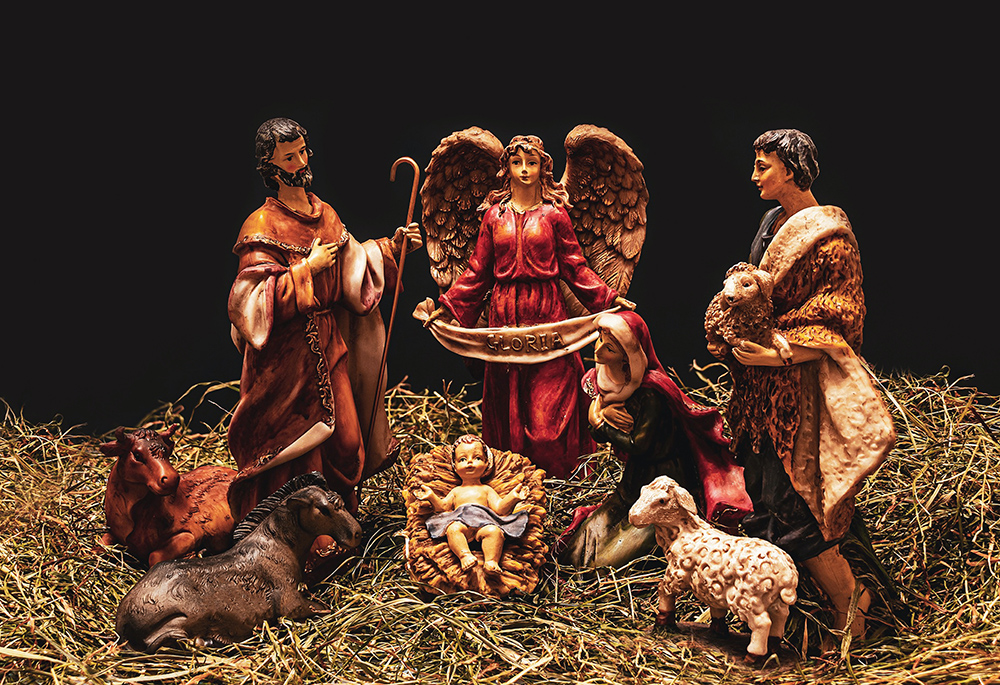
Which Christmas Mass are you going to? When I was a child, we went to an early morning Mass — before we could see what Santa brought. Whichever celebration you choose, unless perhaps the Mass at Dawn, you know it is going to be crowded. Everything about Christmas is sacramental, awakening the Catholicism in folks who may exhibit little interest in religiosity during most of the year. (Note the crowds at Christmas Masses, and give thanks that so many people want to celebrate God’s love — even if not on a regular basis.)
Christmas invites everybody to feel at home. As we set up the nativity scenes and contemplate the characters, I suspect we often feel at most at home with the shepherds. It’s delightful to think of those folks who were just going about their business, expecting nothing more than another long night, when suddenly they became the audience for an angelic chorus. Many of us know the script because in « A Charlie Brown Christmas » Linus has taught us to repeat:
I bring unto you good tidings of great joy, which shall be to all people. For unto you is born this day in the City of David a Savior, which is Christ the Lord. And this shall be a sign unto you; Ye shall find the babe wrapped in swaddling clothes, lying in a manger.
While we gladly sing that, it’s actually a very odd image to make the centerpiece of such extraordinary celebration. Perhaps we’re charmed by specialized language like swaddling clothes and the manger. The declaration is far more dramatic than saying, « Go to a little town nearby and you’ll find a baby wearing diapers, sleeping in a feedbox. »
What a sign! A baby wearing diapers! Yet that’s the message of this feast. The Gospel of John (the reading for our Mass during the Day) gives us all the solemnity we can handle with the solemn proclamation: « In the beginning was the Word, and the Word was with God, and the Word was God. … And the Word became flesh and dwelt among us. » But that glorious declaration simply tells us that the Word of God became mortal, limited and needy. Jesus the Christ, the Word of God incarnate, needed someone to change his diapers.
We have five sets of readings for the feast of the Nativity of the Lord, including the Vigil Mass. The Gospel for the Vigil comes from Matthew, recounting the genealogy describing Jesus as a descendant of Abraham and David, then telling last Sunday’s story of Joseph’s dilemma.
The Mass during the Night begins with Isaiah’s promise that the boots that tramped battle and the cloaks rolled blood will be forgotten and the people who walked in darkness will see a great light. (Imagine how Ukrainians hear that!) Luke’s Gospel accompanies this with the story of Jesus’ birth to the homeless pilgrims, Mary and Joseph and the announcement to the shepherds. During the Mass at Dawn, we sing Psalm 97, « A light will shine on us this day, » and we hear of the shepherds’ visit to the newborn child and his parents.
Finally, in the Mass during the Day, Isaiah proclaims, « How beautiful upon the mountains are the feet of him who brings glad tidings, » and we sing, « All the ends of the earth have seen the saving power of God! » Then we hear John’s solemn proclamation that includes the terrible truth: « He came to his own, but his own people did not accept him. »
The baby creates the charm of Christmas. Babies promise a future and inspire our tenderness and protectiveness. We are awed at their fragility. The scandal of Christmas is that it reveals that this is how God comes: vulnerable and fragile, unwelcomed at home while reverenced by the poor and strangers.
All our Nativity stories include hints of the end — both the cross and resurrection, Jesus’ rejection and love’s triumph through him. Christmas reminds us that God remains among us weak and mild. The baby Jesus can represent a sweet message and also the earth-shattering revelation that God’s power is the antithesis of domination. The shepherds and Magi, Caesar and Herod, remind us that not everyone desires Emmanuel, God-with-us, and that those who reject Emmanuel will stop at nothing to carry out their plan. The coming of Christ, then and now, is what the poet William Butler Yeats called « a terrible beauty. »
Today, it is we who must incarnate the promise of peace to people of goodwill. In a world in which at least 30 nations are at war, we who flock to the manger are called and empowered to become sacraments of Emmanuel. Let us wonder at the babe and remember that we must be the body of Christ today. That’s why he came in the first place.